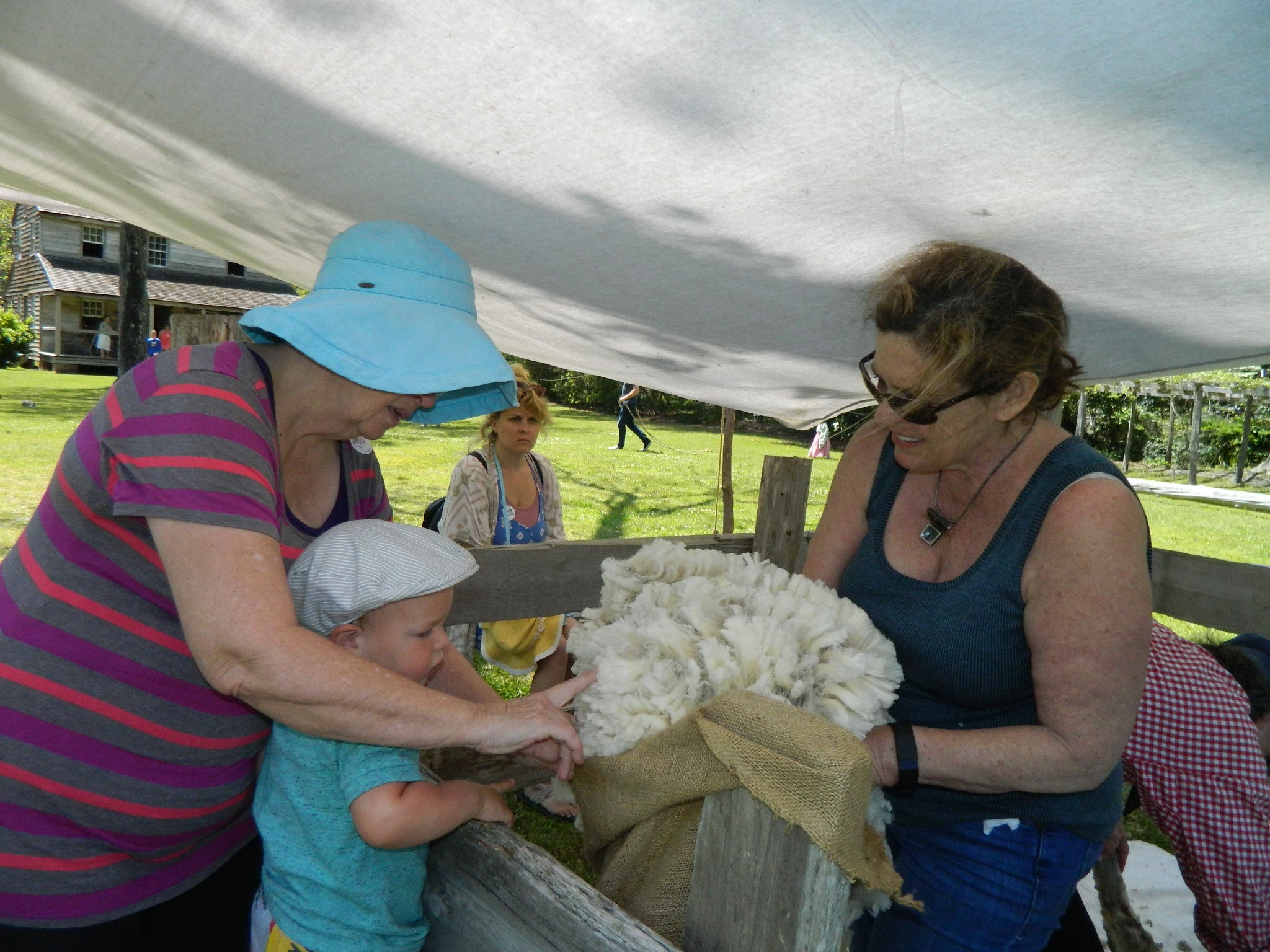A step back in time at Island Farm
Published 11:40 am Thursday, May 3, 2018
Walking onto the old Etheridge farmstead grounds on Roanoke Island can be like taking a trip back in time to the mid-1800s.
This past Saturday, April 28, was no exception ,and about 200 people made the transition to mid-19th century life to watch farm staff shear sheep with old fashioned hand clippers.
“We shear them twice a year,” said Beth Burns, Island Farm shepherd. “Once in the spring and again in the fall.”
With currently about half a dozen sheep in her flock, Burns said some are Romney sheep and the rest are Merinos.
Romney sheep are a domestic breed of sheep from the United Kingdom. Also called Romney Marsh, the breed traces its beginning to the marshy area of Kent in England and were first imported North America in 1904 by William Riddell and Sons of Monmouth, Oregon, where their popularity increased rapidly.
The Merino breed originated in southwestern Spain and are regarded as having some of the finest and softest wool of any sheep. Poll Merinos have no horns or in some cases just very small stubs, and horned Merino rams have long, spiral horns which grow close to the head.
“I got the Romney first because they’re cute,” said Burns. “But the Merino are like the Cadillac of sheep and now I stick with them.”
After selecting a candidate for trimming, Burns joins Gene Staples and Nelson Edmondson get the sheep in place on its side and the latter two start clipping with metal clippers very much like the type that would have been used in the 1840s.
“This is the real deal,” said one of several visitors watching from outside the fence. “No motorized mechanical devices here.”
With a repetitious clip, clip, clip in the background, Burns picked up several tufts of wool scattered on the ground and drops the wool into a burlap bag hanging on a fence post. In the process she also shares some wool with visitors allowing them to feel and smell it.
“We’re not sure what type sheep were on the original farm,” said Burns in response to a visitor’s question. “Records do not list much weight for the wool so it’s hard to tell.”
As the clipping continues, Staples explains that sheep shearing takes between 90 minutes to four hours for each sheep.
“Experience and cooperation from the sheep make the difference,” Staples explained.
Staples said he started with no previous experience and for his first session he mostly watched. Now in his sixth season the process is much smoother and faster.
“The first year for sheep is generally the toughest,” Staples continued. “They figure it out over time and eventually calm down.”
Sheep shearing was not the only demonstration activity for visitors.
Island Farm is a project under the nonprofit group Outer Banks Conservationists, Inc. Living history site interpreters in period attire demonstrate how life was on the Etheridge farmstead in the mid-1800s.
Walking about the grounds visitors can explore about a dozen buildings including the restored farmhouse built by Adam Etheridge on land that farmed by his family since the mid 1700s. The two-story structure is the oldest period house on Roanoke Island, and even has some of the original 19th-century furnishings. Other building include a reconstructed slave cabin, cook-house, smokehouse, chicken coop, and blacksmith shop. A family graveyard is nearby with the final resting place of Mr. Etheridge and many of his descendants.
Out behind the farmhouse visitors chatted with Charlene Staples while she heats wool in a large pot of water and lye soap.
Scooping it out to removes some of the debris, she then places it into a cool wash to get more debris out.
“Sand spurs are the worst part,” she said.
“After a while her wool goes to a final rinse, and then spread out on the farmhouse porch in the sun to dry. Later in the day when the sun has shifted the wool is moved to a blanket in the yard.
The next step is hand carding the wool using a pair of wooden paddles with wire faces. A traditional method of preparing it for spinning, carding helps separate and straighten wool fibers making spinning easier. Once that is done you have rovings, long and narrow bundles of wool fiber, ready to be spun.
Back at the front of the farmhouse Bernadette Wilmot was demonstrating her spinning wheel techniques. A volunteer originally from New York, Wilmot said she uses her own wheel bought in 1992.
“It was in a barn,” explains Wilmot. “They told me it was 150 years old when she bought it. The owner said her husband’s family did not like her so they never taught her how to use it so she sold it to me.”
On the other side of the porch Terri Russo-Meeks was helping some younger visitors learn how to use a knee paddle tape loom. She explained that the wooden loom can be used to make bag ties, suspender straps, belts, harnesses all fundamental 1800s products.
Not everything on display involved wool.
Back in the southern corner of the property Lee Brickhouse had a chicken over the fire.
Often separated from the main house to reduce the risk of a fire damaging sleeping quarters, and because of the level of summer cooking heat, kitchens were often in a separate building.
As people filtered in and out Brickhouse explained some of his cooking techniques and how many of his mid 19th century utensils might be used. He also explained that the Etheridge family had slaves who likely slept in the upstairs loft.
“It’s the educational tours is what win you over,” commented Brickhouse.
A former volunteer, Brickhouse said he averages three days a week on the farm and recruits other family members to help out with special events.
After taking a short break for lunch, Burns, Staples and Edmondson were back in action shearing more sheep.
“This is one of our better and more popular events of the season,” explained Staples.
From April through November Island Farm located at 1140 US Highway 64, north of Manteo is open 10 a.m. to 4 p.m. Tuesday through Friday. There is an admission fee to help cover animal care expenses with children 5 and under free.
For more information visit theislandfarm.com/ or call (252) 473-6500.






